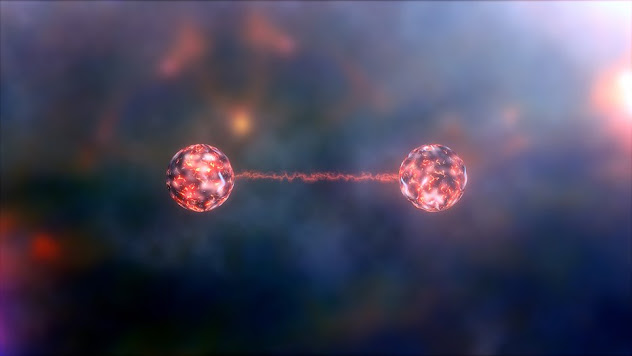''' QUBIT
-QUANTUM-
QUOTE '''
THE WORLD STUDENTS SOCIETY - QUANTUM COMPUTING : BUILDING A MYSTERY. More important, would there be any point? But it quickly became apparent that the answer was yes. Democracy -Justice- Equality
Regular computers [ or classical computers, as quantum snobs called them ] work with information in the form of bits. Each bit can be either a 1 or a 0 at any one time.
The same is true of any arbitrarily large collection of classical bits ; this is pretty much the foundation of information theory and digital computing as we know them. Therefore, if you ask a classical computer a question, it has to proceed in an orderly, linear fashion to find an answer.
NOW IMAGINE a computer that operates under quantum rules. Thanks to the principle of superposition, its bits could be 1, or 0, or 1 and 0 at the same time.
In its superposed state, a quantum bit exists as two equally possible possibilities.
According to one theory, at that moment it's operating in two slightly different universes at the same time, one in which it's 1, one in which it's 0, the physicist David Deutsch once described quantum computing as ''the first technology that allows useful tasks to be performed in collaboration between parallel universes.''
Not only is this excitingly weird, it's also incredibly useful. If a single quantum bit [ or as they're inevitably called, qubits, pronounced cubits] can be in two states at the same time, it can perform two calculations at the sametime. Two quantum bits could perform four simultaneous calculations, three quantum bits could perform eight, and so on. The power grows exponentially.
The supercooled niobium chip at the heart D-Wave Two has 512 qubits and therefore could in the theory perform 2 /532 operations simultaneously. That's more calculations than there are atoms in the universe, by many orders of magnitude.
'' This is not just a quantitative change,'' says Colin Williams, D-Wave's director of business development and strategic partnerships, who has a Ph.D in artificial intelligence and once worked as Stephen Hawking's research assistant at Cambridge.
'' That kind of physical effects that our machine has access to are simply not available to supercomputers, no matter how big you make them. We're tapping into the fabric of reality in a fundamentally new way to make a kind of computer that the world has never seen.''
NATURALLY, A LOT OF PEOPLE WANT ONE. This is the age of Big Data, and we're burying ourselves in information - search queries, genomes, credit-card purchases, phone records, retail transactions, social media, geological surveys, climate data, surveillance videos, movie recommendations -and D-Wave just happens to be selling a very shiny new shovel.
'' Who knows what fund managers would do with one of these and the black-swan event that that might entail?'' says Steve Jurvetson, one of the managing directors of Draper Fisher Jurvetson. '' For many of the computational traders, it's an arm race.''
One of the documents leaked by Edward Snowden, published not too long ago, revealed that the NSA has an $80 million quantum-computing project suggestively code-named Penetrating Hard Targets.
Here's why : much of the encryption used online is based on the fact that it can take conventional computers years to find the factors of a number that is the product of two large primes.
A quantum computer could do it so fast that it would render a lot of encryption obsolete overnight. You can see why the NSA would take an interest.
But while the theory behind quantum computing is reasonably clear, the actual practice is turning out to be damnably difficult. For one thing, there are sharp limits to what we know how to do with a quantum computer.
Cryptography, and the simulation of quantum systems are currently the most promising applications, but in many ways quantum computers are still a solution looking for the right problem.
For another, they're really hard to build. To be maximally effective, for qubits have to exhibit quantum behaviour, not just the superposition but also entanglement [ when the quantum states of two or more particles become linked to one another ] and quantum tunneling [just Google it].
But they can do that only if they're effectively isolated from their environment -no vibrations, no electromagnetism, no heat. No information can escape : any interactions with the outer world would cause errors to creep into the calculations.
This is made even harder by the fact that while they're in their isolated state, you still have to be able to control them.
There are many schools of thought on how to build qubit - D Wave makes its in the form of niobium loops, which become superconductive at ultra low-temperatures - but all quantum-computing endeavours struggle with this problem.
The Honour and Serving of the Latest Global Operational Perspective on Quantum Computing, continues. The World Students Society thanks author Lev Grossman.
With most loving and respectful dedication to the Global Founder Framers of !WOW!, and then Students, Professors and Teachers of the world. See Ya all prepare for Great Global Elections on : wssciw.blogspot.com and Twitter X !E-WOW! - The Ecosystem 2011 :
Good Night and God Bless
SAM Daily Times - the Voice of the Voiceless

.png)


0 comments:
Post a Comment
Grace A Comment!